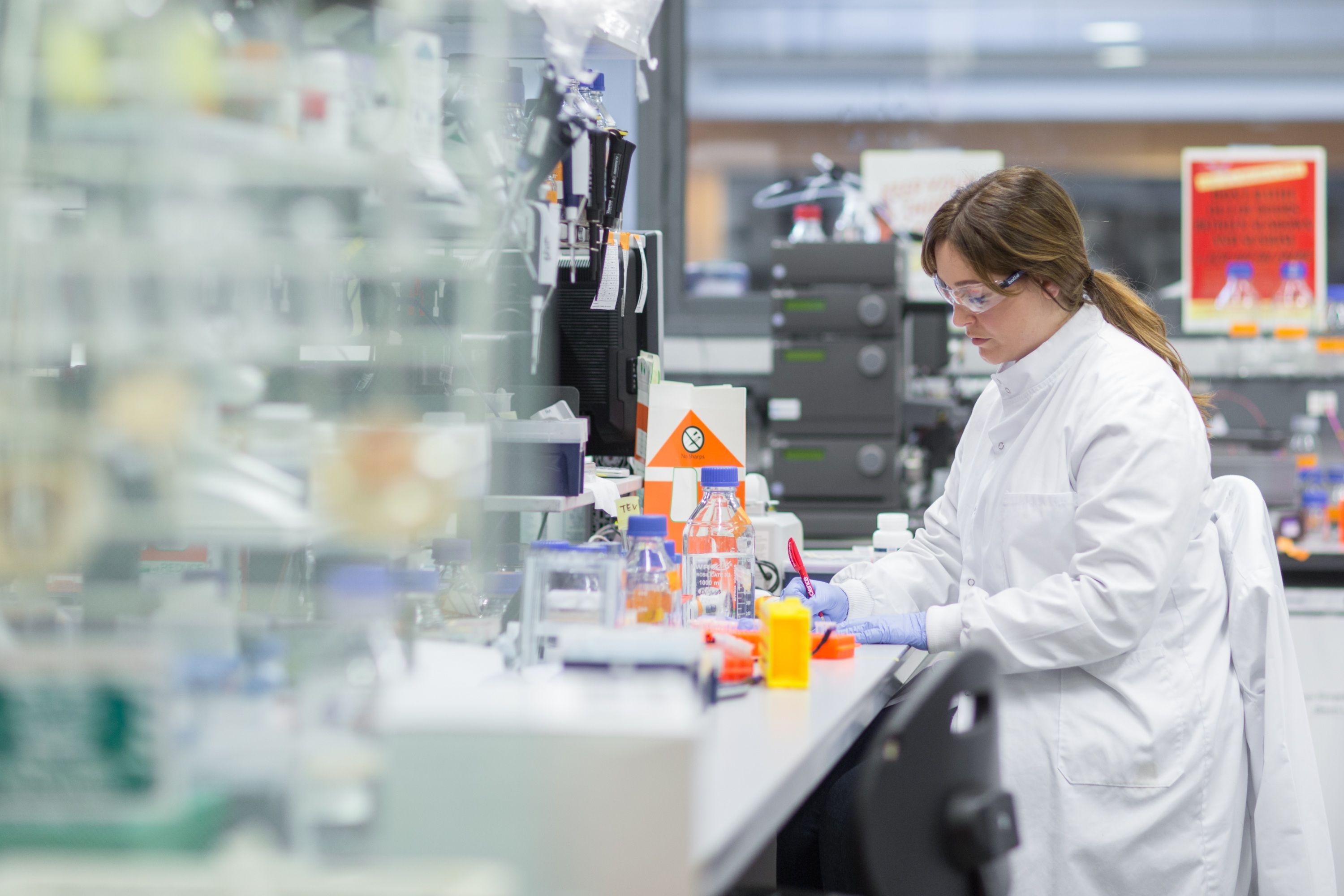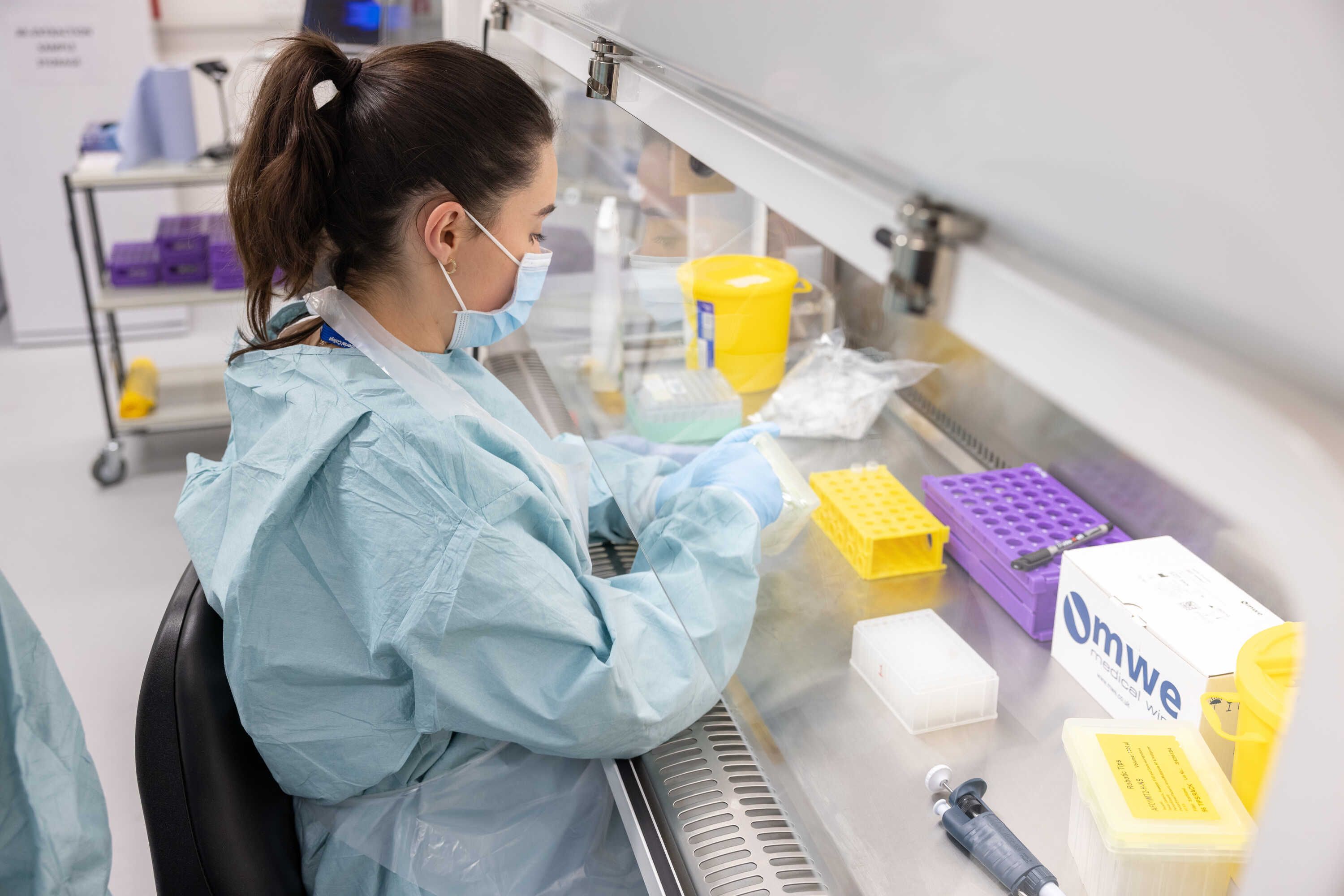
Molecular Biology and Pathology of Viruses
Analyse the nature of viruses as cellular parasites and their importance in human, animal and plant diseases.
Analyse the nature of viruses as cellular parasites and their importance in human, animal and plant diseases
Engage with leading experts in virology and molecular biology and attend the UK’s principal virology conference
Develop your research skills and carry out a laboratory-based research project
Course key facts
-
Qualification
-
MSc
-
-
Duration
1 year
-
Start date
September 2025
-
Study mode
Full-time
-
Fees
£15,500 Home
£45,000 Overseas
-
Delivered by
-
Location
-
South Kensington
-
Minimum entry standard
-
2:1 in Biological Sciences, Biochemistry, Biophysics, Medicine, Physiology, Veterinary Sciences or a related Biomedical science subject.
-
The department will consider 2:2 on a case-by-case basis.
Course overview
Examine the fundamental nature of viruses as molecular machines and cellular parasites on this Master's course.
You'll consider their importance in human, animal and plant diseases and explore recent major advances in the understanding of how the viruses manipulate host cellular machineries to establish infection.
The programme also covers the molecular mechanisms of virus replication, virus disease pathogenesis, and the emergence of novel viruses, alongside the intrinsic defences mounted by our cells, as well as exploring the therapeutic strategies for detecting, preventing and treating viral diseases.
You'll engage with experts from many areas of molecular virology and cell biology during the course. Through this collaborative work, you'll develop skills to embark on further study at PhD level or support a career in academic or industrial research.
Two research projects also provide an opportunity to learn and apply techniques to important research problems.
Structure
This page is updated regularly to reflect the latest version of the curriculum. However, this information is subject to change.
Find out more about potential course changes.
Please note: it may not always be possible to take specific combinations of modules due to timetabling conflicts. For confirmation, please check with the relevant department.
You’ll take all of these core taught modules.
Taught modules
Examine viruses at the molecular level including the structure of virus particles and virus genomes, and the interactions of viruses with cells.
Explore the pathogenesis of virus-induced diseases – from viral immunology, oncogenesis, emergence and evolution, to strategies for the detection, treatment and prevention of virus infections.
Build your experimental design skills and research methods to safely perform a guided laboratory based experimental project.
You'll also analyse and interpret your data to address the objectives of the project.
Develop your critical judgement and communication skills and learn techniques and strategies to study the structure of research publications.
You'll join an academic research laboratory to carry out an original research project investigating an important question on a subject related to virology.
During the six-month project, you'll work under supervision in a research team, interacting with researchers working in related areas.
You'll also attend the Annual Conference of the Microbiology Society.
Most projects are carried out within the Department of Infectious Disease at Imperial College. However, some may be carried out at other Imperial campuses or with external research institutions in the UK, or possibly abroad.
You will give an oral presentation of your project to your peers, and your work will be assessed by a 10,000 word thesis and an oral ‘viva’ examination.
Teaching and assessment
Teaching and learning methods
-
Seminars
-
Group tutorials
-
Lectures
-
Journal clubs
-
Group work
-
Independent study
-
Data interpretation sessions
-
Conference
-
Virtual learning environment
-
Laboratory skills sessions
Balance of assessment
Key
- Modules and mini-research project
- Research project
- 50% Modules and mini-research project
- 50% Research project
Assessment methods
-
Scientific writing abstract or summary
-
Written examinations
-
Poster and oral poster presentation
-
Individual written project report
-
Literature review
-
Research grant proposal
-
Research project thesis
-
Oral examination
Entry requirements
How to apply
Apply online
You can submit one application form per year of entry. You can choose up to two courses.
Once your application has been reviewed, all shortlisted applicants will be interviewed by academic member(s) of the course teaching team. Candidates will be notified within two weeks of the interview.
There is no application fee for MRes courses, Postgraduate Certificates, Postgraduate Diplomas, or courses such as PhDs and EngDs.
If you are applying for a taught Master’s course, you will need to pay an application fee before submitting your application.
The fee applies per application and not per course.
- £80 for all taught Master's applications, excluding those to the Imperial College Business School.
- £100 for all MSc applications to the Imperial College Business School.
- £150 for all MBA applications to the Imperial College Business School.
If you are facing financial hardship and are unable to pay the application fee, we encourage you to apply for our application fee waiver.
Find out more about how to apply for a Master's course, including references and personal statements.
An ATAS certificate is not required for students applying for this course.
Tuition fees
Home fee
2025 entry
£15,500
You should expect and budget for your fees to increase each year.
Your fee is based on the year you enter the university, not your year of study. This means that if you repeat a year or resume your studies after an interruption, your fees will only increase by the amount linked to inflation.
Find out more about our tuition fees payment terms, including how inflationary increases are applied to your tuition fees in subsequent years of study.
Whether you pay the Home or Overseas fee depends on your fee status. This is assessed based on UK Government legislation and includes things like where you live and your nationality or residency status. Find out how we assess your fee status.
If you're a UK national, or EU national with settled or pre-settled status under the EU Settlement Scheme, you may be able to apply for a Postgraduate Master’s Loan from the UK government, if you meet certain criteria.
For courses starting on or after 1 August 2024, the maximum amount is £12,471.
The loan is not means-tested and you can choose whether to put it towards your tuition fees or living costs.
Overseas fee
2024 entry
£45,000
You should expect and budget for your fees to increase each year.
Your fee is based on the year you enter the university, not your year of study. This means that if you repeat a year or resume your studies after an interruption, your fees will only increase by the amount linked to inflation.
Find out more about our tuition fees payment terms, including how inflationary increases are applied to your tuition fees in subsequent years of study.
Whether you pay the Home or Overseas fee depends on your fee status. This is assessed based on UK Government legislation and includes things like where you live and your nationality or residency status. Find out how we assess your fee status.
If you're a UK national, or EU national with settled or pre-settled status under the EU Settlement Scheme, you may be able to apply for a Postgraduate Master’s Loan from the UK government, if you meet certain criteria.
For courses starting on or after 1 August 2024, the maximum amount is £12,471.
The loan is not means-tested and you can choose whether to put it towards your tuition fees or living costs.
Scholarships
The Dean’s Master’s Scholarships
Value per award
- £10,000
Who it's for
- All students applying to study a Faculty of Medicine Master’s course
The Dr Jean Alero Thomas Scholarships
Value per award
- Partial or full tuition fee at the Home rate
Who it's for
- All students applying to study a Faculty of Medicine lab-based Master’s course
How will studying at Imperial help my career?
Be equipped with the skills to pursue PhD study, or if medically qualified, move into clinical practice or research.
With specialised knowledge, you'll be highly sought after in a range of sectors.
Testimonials
Further links
Contact the department
- Telephone: +44 (0)20 7594 5873
- Email: a.pastuszek@imperial.ac.uk
Course Director: Professor David Rueda
Visit the Department of Infectious Disease website.

Request info
Find out more about studying at Imperial. Receive updates about life in our community, including event invites and download our latest Study guide.

Events, tasters and talks
Meet us and find out more about studying at Imperial.

Terms and conditions
There are some important pieces of information you should be aware of when applying to Imperial. These include key information about your tuition fees, funding, visas, accommodation and more.
You can find further information about your course, including degree classifications, regulations, progression and awards in the programme specification for your course.
Programme specifications